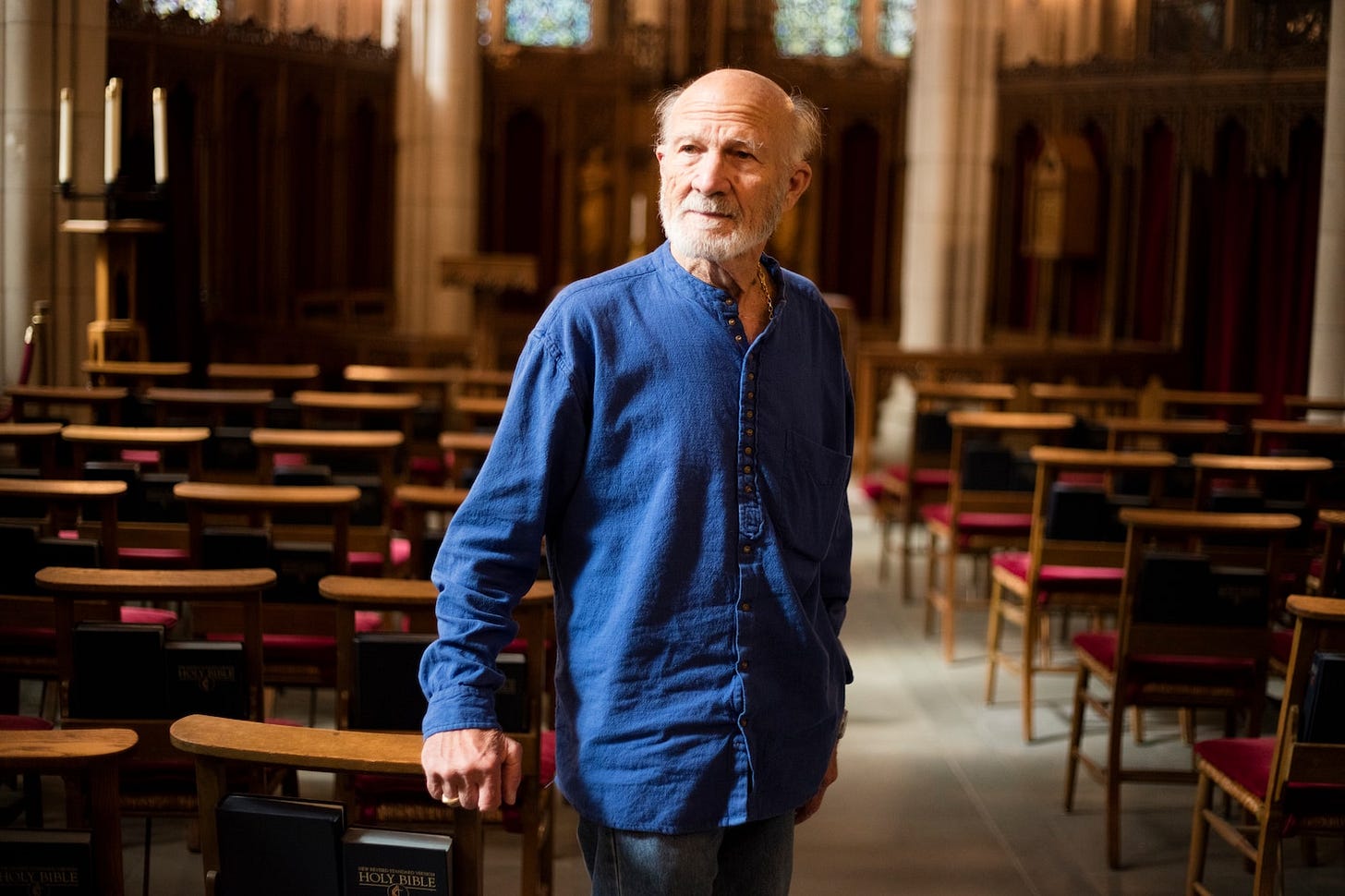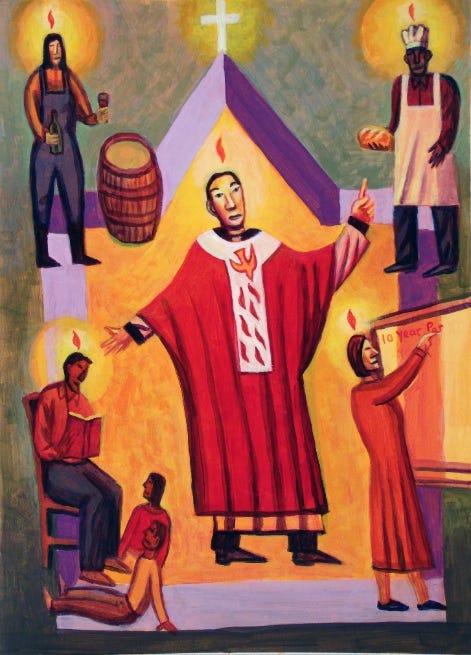You Can't Handle the Truth
"Through our baptism, God makes us part of a people vulnerable to truth.” - Dr. Stanley Hauerwas
A few weeks ago, I led a conversation among members of the Mount Olivet community about four essays over four weeks written by Dr. Stanley Hauerwas.[i] These essays were really letters Dr. Hauerwas wrote to his godson. Each letter considers a specific virtue and its meaning for a child growing year by year in the Christian faith. Each letter was delivered to Dr. Hauerwas’ godson, Laurie Wells, on the occasion of Laurie’s baptism and every year after. Dr. Hauerwas is a professor of Christian Ethics at Duke Divinity. It would have been easy for Dr. Hauerwas to dispense his knowledge of virtues all at once. After all, as the author or contributor to more than 23 books and as a seminary professor, dispensing a large amount of information at one time is one of Dr. Hauerwas’ specialties. Instead, these letters were delivered over the span of 16 years.
Echoing Jesus in verse 12 of our reading, Dr. Hauerwas writes to Laurie something like, “I have many things to tell you, but you cannot bear them all now.”
Our scripture reading places us two chapters away from the betrayal and arrest of Jesus. Smackdab, in the middle of what is known as the “Farewell Discourse,” the loquacious Word Made Flesh, is preparing his disciples for life and ministry without him. Ever since calling the disciples away from their families, fishing nets, and tax booths Jesus has been teaching them about the inbreaking of the Kingdom of God that began in the womb of his mother, Mary.
Preaching, teaching, and healing from one side of Galilee to the other, now Jesus is preparing his disciples for their own ministries of preaching, teaching, and healing. Yet, there is more for these disciples to learn. Three years of ministry is not enough time to unpack all that comes with a title like the Word Made Flesh. Jesus has too much to say and not enough time to say it. He is the full revelation of God in human flesh, after all.
At the beginning of his farewell discourse, Jesus declares himself to be “the way, the truth, and the life.” Jesus is the truth, and the events that are to come – his betrayal and arrest, death, resurrection, and ascension – will not be fully grasped in real-time by his disciples. Jesus knows they will need help to fully understand everything that has and will happen. Without the help of the Holy Spirit, the disciples’ understanding of Jesus as “the way, the truth, and the life” may be questioned or even discarded.
Never the one to abandon those he calls, Jesus tells his disciples, then and now, that the Holy Spirit will “guide” them.
The Holy Spirit will guide us.
Jesus tells us the Holy Spirit will “take you by the hand and guide you into all the truth there is.” The Holy Spirit will not “draw attention to himself, but will make sense out of what is about to happen, indeed out of all that” Jesus “has done and said.”
Jesus tells his disciples that they, we, will not be left on our own to make sense of the work of God. We are not left to ourselves to decipher what a faith-filled life looks like or how to respond to the call Jesus has placed on each of our lives.
Last Sunday was Pentecost and Confirmation Sunday. We confirmed 13 students into a faith-filled life. For several months our confirmation class intentionally studied the faith they had been baptized into as infants. A faith that can only make sense in a community and through the power of the Holy Spirit.
A few weeks before Confirmation Sunday, we baptized Charlie into the faith. This church is in the business of baptizing people into the faith. Back in 2018, we baptized my daughter Nora. Every time we baptize a new believer or confirm someone baptized as a child, the pastor asks the congregation, “will you nurture one another in the Christian faith and include this person now before you in your care?”[ii] I nearly have the question memorized. And then, the entire congregation responds, “With God’s help we will proclaim the good news and live according to the example of Christ. We will surround this person with a community of love and forgiveness, that they may grow in their trust of God, and be found faithful in their service to others. We will pray for them, that they may be true disciples who walk in the way that leads to life.”
I’m sure many of you have that response memorized. It is a response and responsibility we cannot take lightly.
Through congregational responses at baptisms and confirmations, we are acknowledging that the same Spirit Jesus promised to his first disciples is at work through this community of faith along with every other community that faithfully proclaims the Good News of the Gospel. We pray over each candidate for baptism and confirmation, “The Holy Spirit work within you that being born through water and the Spirt you may be a faithful disciple of Jesus Christ.”[iii]
Baptisms and confirmations are a public act of profession. Sure the photos would probably turn out better if baptisms were private but what we would miss is that the Holy Spirit quickens the community’s sensitivity to the revelation of the Triune God – Father, Son, and Holy Spirit – and moves us to a deeper appreciation and understanding of the truth of God revealed in Christ; Our sins have been forgiven not because we did anything but through the faithfulness of Jesus Christ. This is the reason baptisms, and even confirmations, are not private affairs done behind the back of the larger congregation.
While the forgiveness of our sins has been completed, discovering the Christian faith is not a one-and-done event. Baptism and confirmation are not bookends in the same way that the crucifixion of Jesus was not the end. Discipleship, the churchy way of saying to follow Jesus, requires a lifetime and then some.
This is why we study the scriptures as children, teens, and adults.
This is why we worship as a community and are not separated with services only for children, teens, or adults.
This is why we engage in mission as a community.
One of the things we discovered in our discussion of essays written by Dr. Hauerwas was how each of the virtues, every single one, pointed back to the Truth revealed in Jesus Christ. It felt like we were a broken record each week pointing to Christ. Time and time again, we were reminded that we learn the virtues of the Christian faith through the faithful ministry of Christ, revealed to us through the Holy Scriptures through and the power of the Holy Spirit, in a community bound together in Christ’s resurrection.
Here is where the work of mentors in the faith and godparents like Dr. Hauerwas become ever important. Dr. Hauerwas writes, “Through our baptism, God makes us part of a people vulnerable to truth.”[iv] We are vulnerable to the works of Christ, made clear by the Holy Spirit, while being held in the love of our Creator. Three-in-one, never separated, yet each at work in the church’s life and the lives of those filling the pews. To learn truth leads us to God – understood through the love of our Creator, the Grace of Christ, and the teaching of the Holy Spirit.
[i] Hauerwas, Stanley. The Character of Virtue: Letters to a Godchild. Eerdmans. 2018.
[ii] United Methodist church Baptismal Liturgy
[iii] Ibid.
[iv] Hauerwas, Stanley. The Character of Virtue: Letters to a Godchild. Eerdmans. 2018.








